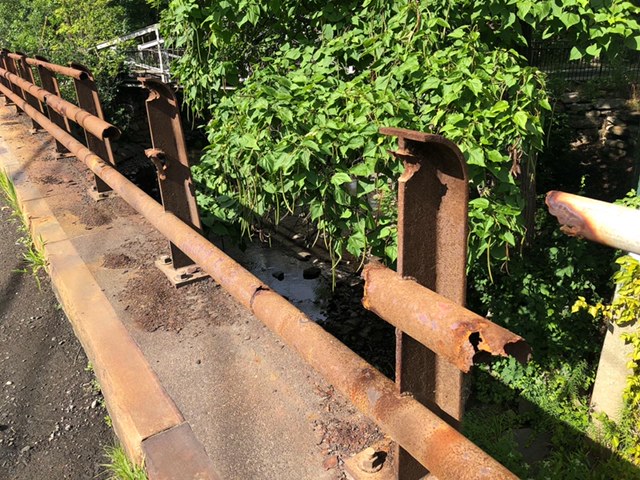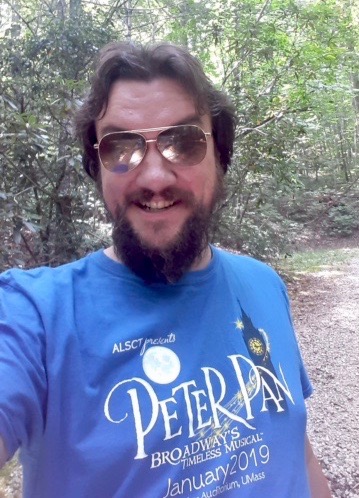Opinion: Vote Yes On Question 1 In November To Make Amherst and Massachusetts More Livable

Decaying railings on the bridge over the Fort River on Route 116 in Amherst. Photo: Ian Rhodewalt

There are three potholes on my street, each about two to three feet wide and four or five inches deep. The PVTA 33 bus route that runs through my neighborhood comes once every 40 minutes, so to get from anywhere on the route to the grocery store or to the Amherst Survival Center by bus is often a several hour round trip. Preschool teachers and para-educators in Amherst and across the state make little more than the minimum wage. I know because I taught preschool for five years locally. In an age of climate catastrophe that is causing unprecedented heatwaves and extreme drought, only 23 of the 180 buses in PVTA’s fleet are electric vehicles. The railings on the bridge where Route 116 crosses Fort River down by Groff Park are completely rusted through in several places.
What do all these disparate pieces of information have to do with each other? They can all be immensely improved, if not outright resolved, by the passage of the Fair Share Amendment, which will be on the ballot as Question 1 in November.
The Fair Share Amendment is a proposed amendment to the Massachusetts constitution that would make those who make more than a million dollars a year pay their fair share in taxes. The amendment would create an additional tax of four percentage points on the portion of any individual’s annual income above the first million dollars, and constitutionally dedicate those funds directly to quality public pre-K-12 education, affordable public colleges and universities, maintenance and repairs of roads and bridges, and public transportation. Question 1 would bring in an estimated $2 billion/year in new revenue that is constitutionally required to go to transportation and public education – finally allowing us to make the sustained investments we’ve needed for far too long. With sustained funding we can make certain that educators at all levels are paid a living wage, ensure that classrooms have a teacher/student ratio that is optimum for learning, rebuild crumbling school buildings across the state, and retain quality, experienced teachers who are finding it more and more untenable to stay in the field of education. We could fix our potholes, repair our bridges, and invest in the PVTA as well as East-West rail.
Under Massachusetts’ current tax system, those who make than a million dollars a year – only about 20,000 individual households out of the state’s population of 6.9 million people – pay about 6% of their income in state and local taxes, while the rest of us pay closer to 10% of our income. By voting yes on Question 1 the super-rich will pay their fair share in taxes, and we will all benefit from better and safer roads, and well-resourced schools. I am very grateful to the Amherst Town Council, the Amherst School Committee, and the Amherst Democratic Town Committee who have all passed resolutions supporting the Fair Share Amendment, and to the number of local businesses, including Amherst Books and Cushman Market & Cafe, that have also endorsed Question 1. Passing the Fair Share Amendment is a win-win for all, and can help make Amherst a more livable town, and Massachusetts a more livable state. I urge all Amherst voters – and voters across the state – to vote yes on Question 1 on November 8 for this historic ballot initiative.
More information

This is an eye-opener! I never considered what percentage of my total income my property tax comprised!!
(Now I wish i didn’t know!)
I will NEVER vote yes on question 1. The only fair way and what should be on the ballot is a flat rate income tax for everyone…that I could get behind…if I were a millionaire I would either leave the state, work less to make less, or I would hide my assets in debt since debt is not taxed. This is how the rich and wealthy pay little in taxes. They use the loopholes that were created for them…
Mr. Wetherbee is confused — or didn’t read the whole article.
Since millionaires currently pay 6% of their income and the rest of us pay about 10%, adding 4% to the millionaires’ tax rate results in a flat rate: 6% + 4% = 10%.
Just a clarification. Millionaires will only pay the additional 4% on annual income OVER their first million.